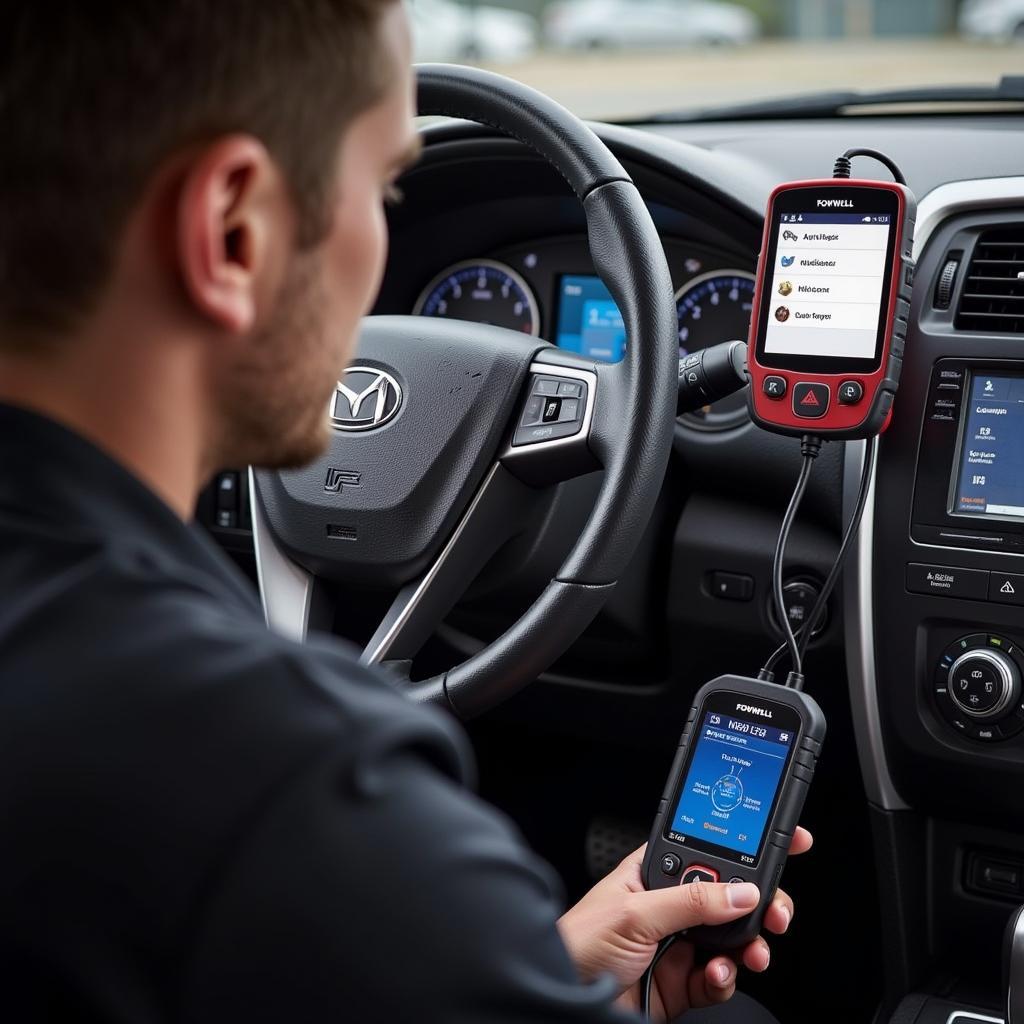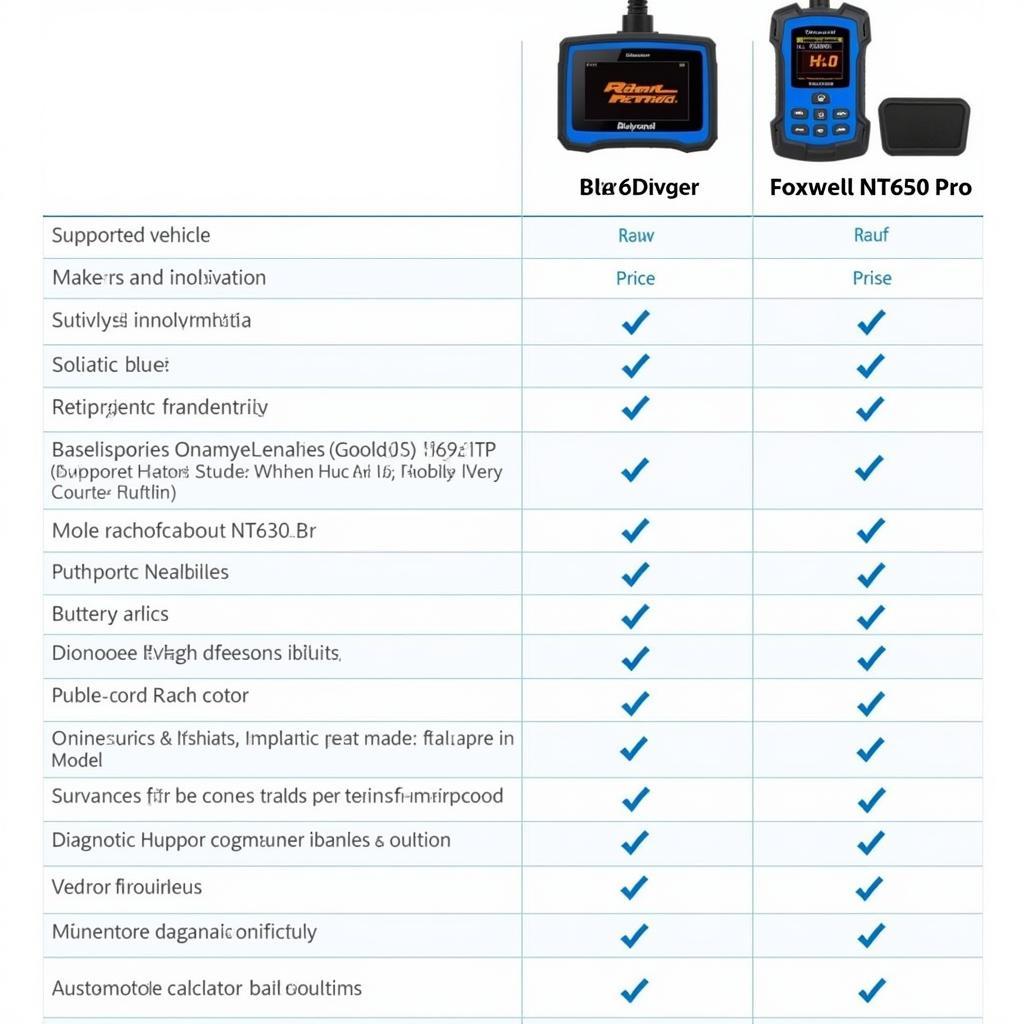A cylinder misfire is a common engine problem that can be diagnosed using an OBD2 scanner like the Foxwell NT301. This comprehensive guide will delve into understanding Foxwell Nt301 Codes For Cylinder Misfires, how to use the scanner effectively, and common causes and solutions for misfires.
One of the most common issues car owners and mechanics face is diagnosing engine problems, particularly cylinder misfires. Foxwell NT301 for Audi A4 offers an effective solution for identifying these issues.
Understanding Cylinder Misfires and Their Implications
Before we delve into the codes, it’s crucial to understand what a cylinder misfire is and why it happens. In a nutshell, a cylinder misfire occurs when the air-fuel mixture in an engine cylinder fails to ignite properly, or the ignition is weak, leading to incomplete combustion. This can be caused by various factors, ranging from faulty spark plugs and ignition coils to issues with fuel delivery or compression.
Ignoring a cylinder misfire can lead to:
- Reduced engine performance: You might notice a decrease in power and acceleration.
- Poor fuel economy: Misfires can significantly impact your fuel efficiency, costing you more at the pump.
- Increased emissions: Incomplete combustion releases harmful pollutants into the atmosphere.
- Catalytic converter damage: Over time, unburnt fuel from misfires can damage the catalytic converter, leading to costly repairs.
Foxwell NT301: Your Go-To Diagnostic Tool
The Foxwell NT301 is a powerful yet user-friendly OBD2 scanner that can help you pinpoint the cause of a cylinder misfire. It reads the diagnostic trouble codes (DTCs) stored in your vehicle’s ECU (Engine Control Unit), giving you valuable insights into the problem.
Here’s why the Foxwell NT301 is a great choice for diagnosing misfires:
- Wide vehicle compatibility: The NT301 works with a wide range of vehicle makes and models.
- Accurate readings: It retrieves both generic and manufacturer-specific codes, providing a comprehensive diagnosis.
- Easy to use: The scanner features a simple interface and clear instructions, making it suitable for both DIYers and professionals.
- Affordable: The Foxwell NT301 offers excellent value for its price compared to more expensive scanners.
Deciphering Foxwell NT301 Misfire Codes
When a cylinder misfire is detected, the Foxwell NT301 will display a code that pinpoints the affected cylinder and the nature of the problem. Understanding these codes is crucial for effective troubleshooting. Here are some common Foxwell NT301 misfire codes:
- P0300: Random/Multiple Cylinder Misfire Detected
- P0301: Cylinder 1 Misfire Detected
- P0302: Cylinder 2 Misfire Detected
- P0303: Cylinder 3 Misfire Detected
- P0304: Cylinder 4 Misfire Detected
- P030X: (X representing the cylinder number)
In addition to these, you might encounter other codes related to misfires, such as:
- P020X: Injector Circuit Malfunction – Cylinder X
- P035X: Ignition Coil X Primary/Secondary Circuit Malfunction
Remember: These codes indicate a problem but don’t specify the exact cause. Further investigation is usually required.
Common Causes of Cylinder Misfires
Identifying the root cause of a cylinder misfire is key to implementing the right solution. Here are some of the most common culprits:
1. Spark Plugs:
Worn-out or fouled spark plugs are among the most frequent causes of misfires. A weak spark can lead to incomplete combustion.
2. Ignition Coils:
A faulty ignition coil can’t provide sufficient voltage to the spark plug, resulting in a weak or non-existent spark.
3. Fuel Injectors:
Clogged or malfunctioning fuel injectors disrupt the fuel supply to the cylinders, leading to an improper air-fuel mixture.
4. Vacuum Leaks:
Leaks in the intake manifold or vacuum hoses disrupt the engine’s air-fuel ratio, potentially causing misfires.
5. Compression Issues:
Low compression in a cylinder, often caused by worn piston rings or valve problems, can prevent proper ignition.
6. Sensor Malfunctions:
Issues with sensors like the mass airflow sensor (MAF), oxygen sensor (O2), or throttle position sensor (TPS) can send incorrect data to the ECU, affecting fuel delivery and ignition timing.
Foxwell NT301 F-150 Coil Pack helps you diagnose coil pack issues in Ford F-150 trucks, which are known to experience such problems.
Troubleshooting Cylinder Misfires: A Step-by-Step Approach
Once you’ve identified a cylinder misfire code with your Foxwell NT301, you can proceed with troubleshooting. Here’s a systematic approach:
1. Inspect the Spark Plugs:
Start by visually inspecting the spark plugs in the affected cylinder(s). Look for signs of wear, fouling, or damage.
2. Check the Ignition Coils:
If the spark plugs seem fine, move on to the ignition coils. You can use a multimeter to test the coil’s resistance and ensure it’s within the manufacturer’s specifications.
3. Inspect Fuel Injectors:
Listen for clicking sounds from the injectors when the engine is running. You can also check for fuel leaks around the injectors.
4. Look for Vacuum Leaks:
Visually inspect vacuum hoses for cracks, loose connections, or damage. You can also use a carburetor cleaner to spray around potential leak points while the engine is idling. A change in engine RPM indicates a leak.
5. Perform a Compression Test:
This test measures the pressure in each cylinder and helps identify compression-related issues.
Expert Insight:
“When dealing with cylinder misfires, it’s crucial to address the root cause rather than just replacing parts randomly. A systematic diagnostic approach using a reliable scanner like the Foxwell NT301 is essential for pinpointing the issue and saving time and money in the long run.” – John Miller, ASE Certified Master Technician
Beyond Basic Troubleshooting
If basic troubleshooting doesn’t solve the problem, the issue might be more complex, requiring advanced diagnostics. In such cases, consulting a qualified mechanic with specialized tools and experience is recommended.
Preventive Maintenance: Keeping Misfires at Bay
While not all misfire causes are preventable, regular maintenance can significantly reduce their likelihood.
- Regular Spark Plug Replacement: Adhere to the manufacturer’s recommended spark plug replacement intervals.
- Quality Fuel and Fuel System Cleaning: Using good quality fuel and periodically cleaning the fuel system can prevent injector clogging.
- Timely Air Filter Replacement: A clean air filter ensures the optimal air-fuel mixture, preventing misfires due to a rich fuel mixture.
- Regular Engine Inspections: Periodic engine inspections by a qualified mechanic can detect potential issues early on.
Conclusion
Cylinder misfires, though common, should never be ignored. Early detection and diagnosis using a reliable OBD2 scanner like the Foxwell NT301 can save you from costly repairs and engine damage down the line. Understanding the codes, common causes, and troubleshooting steps empowers you to address misfires effectively and keep your vehicle running smoothly.
Foxwell NT301 2002 Nissan Xterra is a useful resource if you own this particular vehicle model, as it highlights the scanner’s compatibility and how it can be used for various diagnostics, including misfire detection.
Have questions or need help with your Foxwell NT301? Our team of experts at ScanToolUS is here to assist you. Contact us at +1 (641) 206-8880 or visit our office at 1615 S Laramie Ave, Cicero, IL 60804, USA.
Frequently Asked Questions (FAQs)
1. Can I drive my car with a cylinder misfire?
It’s not advisable to drive with a misfire for extended periods. Doing so can lead to further engine damage and potentially leave you stranded.
2. Are all Foxwell NT301 misfire codes the same?
No, different codes indicate different problems. For instance, P0301 signifies a misfire in cylinder 1, while P0201 points to an issue with the injector circuit in cylinder 1.
3. Can a bad battery cause a cylinder misfire?
While a weak battery can cause various electrical problems in a car, it’s unlikely to directly cause a cylinder misfire.
4. Can I fix a cylinder misfire myself?
Depending on the cause, some misfires can be fixed with basic DIY knowledge. However, more complex issues might require professional help.
5. How often should I scan my car for codes?
It’s good practice to scan your car for codes at least once a month or whenever you suspect an engine problem.


